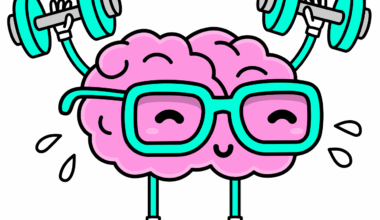Hydration and Mental Focus During Running Sessions
When running or jogging, it is crucial to optimize hydration strategies. Proper hydration enhances performance and supports mental focus. Think about it: during intense running sessions, our bodies lose significant amounts of water and electrolytes through sweat. If not replaced adequately, dehydration can lead to decreased energy levels and reduced concentration. A well-hydrated runner can maintain a clear mind, making it easier to stay aware of surroundings and maintain a steady pace. Therefore, one should develop a personalized hydration plan. Consider factors like duration of the run, weather conditions, and individual sweat rates. Water is essential, but for longer sessions, sports drinks containing electrolytes might be necessary. Keeping a bottle handy or planning hydration stops along the route could help combat dehydration. Failing to hydrate properly may lead to undesirable performance outcomes, potentially risking injury. Incorporating hydration checkpoints into your running routes ensures that you remain energized and focused throughout your workouts. Runners should also listen to their bodies; thirst signals are key indicators that hydration is needed, so don’t ignore them. Making hydration a priority can directly impact running success and mental clarity.
Understanding the Importance of Water Intake
Water intake plays an essential role in maintaining physical and mental performance while running. Studies consistently show that even mild dehydration can impair cognitive functions, affecting decision-making and focus. Therefore, runners must adopt proactive hydration practices to stay ahead of the game. Begin by tracking daily water consumption. Establish a baseline and adjust according to running intensity and environmental conditions. Consider mealtimes; consuming foods with high water content, such as fruits and vegetables, supplements hydration efforts. Moreover, it is beneficial to carry water or electrolyte-rich beverages depending on the distance one plans to run. Drinking before, during, and after a run will help maintain optimal hydration levels, especially during heavy training phases. The temperature can also impact hydration needs, with hotter conditions necessitating more frequent fluid intake. Runners should incorporate hydration strategies such as electrolyte tablets or specialized sports drinks for longer runs. It is also advisable to avoid drinks with high sugars, as they can lead to dehydration. By maintaining an organized hydration schedule, runners can enhance endurance, focus, and overall performance through effective water intake practices.
The timing of hydration is equally important to enhance focus during runs. Before starting a run, drinking adequate amounts of water can prepare the body for physical exertion. However, intake is not solely about quantity; knowing when to hydrate can make a significant difference. A good practice involves consuming water approximately 30 minutes before running. Lighter hydration during runs can help sustain energy without causing discomfort. If running for over an hour, consider quick sips of water or an electrolyte drink to balance lost fluids. Avoiding heavy drinking during runs aids in maintaining performance without bloating or discomfort. Post-run hydration is critical, too. Replenishing fluids afterward restores lost reserves and aids recovery. In this phase, focus shifts to replacing not just water, but also electrolytes. This further supports cognitive functions, ensuring mental clarity during subsequent workouts or daily activities. Furthermore, specific recipes for homemade electrolyte drinks can offer a healthy alternative. Keeping a hydration log can also identify what works best for you, especially if testing different drinks. Stay proactive in hydration for optimal mental focus, elevating running sessions to new performance levels.
Working with Electrolytes
Electrolytes are critical to maintaining hydration balance while running. These minerals, including sodium, potassium, and magnesium, play significant roles in hydration and muscle function. If not replenished, deficiencies can lead to fatigue, cramps, and lack of focus, disrupting your running sessions. Therefore, integrating electrolyte supplements into your hydration strategy is vital. There are various options available today, including sports drinks, electrolyte tablets, and gummies. Choose a product that aligns with your taste preferences and dietary needs, ensuring it can easily fit into your routine. Particularly during long runs, consuming fluids with electrolytes can stave off fatigue and keep you alert. Sports drinks provide a quick solution; however, homemade alternatives can be just as effective and healthier. The addition of a pinch of salt and some fruit juice to water often offers an excellent refreshment, meeting both taste and electrolyte needs. Runners should also practice tailoring their electrolyte intake to their personalized sweat rates to maximize effectiveness. Keeping track of how you feel during and after runs can help fine-tune your approach, ultimately improving running efficiency.
Another essential aspect of hydration for runners involves adjusting to environmental elements. For runners in hotter climates or during the summer months, hydration needs increase dramatically. High temperatures elevate sweating rates, thus escalating fluid loss and the need for replenishment. Recognizing heat as a factor, one must modify hydration plans accordingly. During such conditions, increase the frequency and amount of fluid intake, potentially including electrolyte supplements to counterbalance mineral loss. Additionally, dressing appropriately is critical; lightweight and breathable clothing aids in maintaining hydration levels by allowing sweat to evaporate. Conversely, running in a cold climate presents unique hydration challenges as well. Cold air can desiccate respiratory passages, leading to fluid loss that runners don’t always recognize. As a result, maintaining hydration in winter is equally vital. Carrying versatile hydration systems, such as hydration packs or belts, enables continuous access to fluids during any temperature conditions. Adapt your hydration monitoring techniques, regularly testing yourself for thirst, as it may vary considerably based on weather, run length, or intensity. Effective hydration management should always be individualized and adaptable.
Staying Mindful of Hydration
Staying mindful of hydration encompasses not just physical considerations but also mental awareness. Being aware of your hydration levels directly correlates with performance and concentration. Setting reminders throughout the day can help you form a habit of drinking enough water. Apps tailored specifically for hydration tracking offer alerts to drink at certain intervals, making it easier to prioritize health goals. Additionally, establishing a routine before and during runs creates a pattern that reinforces the importance of hydration. Preparing for runs involves checking weather conditions, as well as fluid needs for the day. Incorporate hydration planning into your running calendar, which can help identify patterns in hydration habits. Keeping a hydration journal combined with both running distances and electrolyte consumption can also yield insights. This practice eventually leads to better hydration practices tailored to individual preferences and responses. Understanding how your body reacts during different workouts fosters a more engaged mindset towards hydration. Ultimately, staying mentally attuned to hydration requirements results in improved focus during runs. Being proactive helps enhance the overall running experience, emphasizing both enjoyment and performance.
In summary, effective hydration strategies play a critical role in enhancing mental focus while running. With a comprehensive understanding of individual hydration needs, runners can develop optimizing hydration regimens. Prioritizing water intake and incorporating electrolytes creates a balanced approach to hydration management. Runners of all levels can benefit from establishing effective hydration routines that account for different climatic conditions. Furthermore, maintaining a hydration routine requires mindfulness and consistency, ensuring that running sessions remain both enjoyable and productive. Engaging with hydration planning can instill a better awareness of hydration, translating into improved performance on every run. Learning the signs of dehydration, such as fatigue or cognitive decline, can reinforce the importance of consistent water intake throughout your workouts. Keeping personal hydration logs allows runners to identify what methods work best based on varying running conditions, so testing out different fluids or weights is crucial. By becoming more intentional about drinking water or electrolyte-rich beverages before, during, and after each run, you can ensure that mental clarity is always preserved. Thus, prioritize hydration strategies for an optimal running experience that fosters both physical endurance and mental sharpness.
Conclusion
Effective hydration strategies are essential for maximizing performance and mental focus during running sessions. The pronounced connection between hydration, energy levels, and cognitive clarity encourages runners to adopt proactive approaches to fluid intake. As we have discussed, incorporating timely water and electrolyte consumption, recognizing individual needs, and adapting to environmental factors can enhance overall running experiences. Whether you’re a seasoned marathoner or a beginner tackling a few miles, hydration should never be an afterthought. Establish a consistent hydration routine, track your intake diligently, and listen to your body’s cues. Reflect on how hydration affects your performance and adjust accordingly to unlock your true potential in running. As you prioritize hydration, not only does endurance improve, but your mental sharpness likewise enhances. Emphasizing hydration establishes a foundation for optimal performance, allowing runners to stay focused and alert. So, equip yourself with a well-structured hydration plan, heed the signals your body sends, and embrace a commitment to hydration that empowers every step of your running journey. Revolutionizing your hydration strategy can turn every running session into a chance for improvement while ensuring mental clarity and optimal performance throughout.


